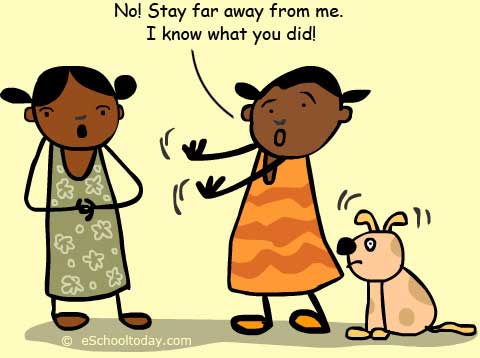 |
What is Stigma?
AIDS-related stigma and discrimination means prejudice, negative attitudes, abuse and maltreatment directed at people living with HIV and AIDS. Many people with HIV and Aids are shunned by family, friends and community. They are treated poorly at the hospital and school. Even at places of worship, worshippers refuse to sit by them.
Stigma towards people living with HIV is very wrong. This is because not everyone had the virus from wrong behavior. If even they did, we are all human and we all make mistakes. We therefore have to accept them and love them, BUT take care not to engage in any risky behavior with them.

Factors that contribute to HIV/AIDS-related stigma include:
 HIV/AIDS is a life-threatening disease, and therefore people fear to relate to it. HIV/AIDS is a life-threatening disease, and therefore people fear to relate to it.
 HIV infection is associated with behaviours such as homosexuality, drug addiction, prostitution or promiscuity, that are already unaccepted in many societies. HIV infection is associated with behaviours such as homosexuality, drug addiction, prostitution or promiscuity, that are already unaccepted in many societies.
 There is a lot of inaccurate information about how HIV is transmitted, creating irrational behaviour and misperceptions of personal risk. There is a lot of inaccurate information about how HIV is transmitted, creating irrational behaviour and misperceptions of personal risk.
 HIV infection is often thought to be the result of personal irresponsibility. HIV infection is often thought to be the result of personal irresponsibility.
 Religious or moral beliefs lead some people to believe that being infected with HIV is the result of moral fault (such as promiscuity) that deserves to be punished. Religious or moral beliefs lead some people to believe that being infected with HIV is the result of moral fault (such as promiscuity) that deserves to be punished.
 The effects of antiretroviral therapy on people’s physical appearance can result in forced disclosure and discrimination based on appearance. The effects of antiretroviral therapy on people’s physical appearance can result in forced disclosure and discrimination based on appearance.
Possible consequences of HIV-related stigma to be:
 Loss of income/livelihood Loss of income/livelihood
 Loss of marriage & childbearing options Loss of marriage & childbearing options
 Poor care within the health sector Poor care within the health sector
 Withdrawal of care giving in the home Withdrawal of care giving in the home
 Loss of hope & feelings of worthlessness Loss of hope & feelings of worthlessness
 Loss of reputation Loss of reputation
Stigma towards people living with HIV is very wrong. This is because not everyone had the virus from wrong behavior. If even they did, we are all human and we all make mistakes. We therefore have to accept them and love them, BUT take care not to engage in any risky behavior with them.

|
|
